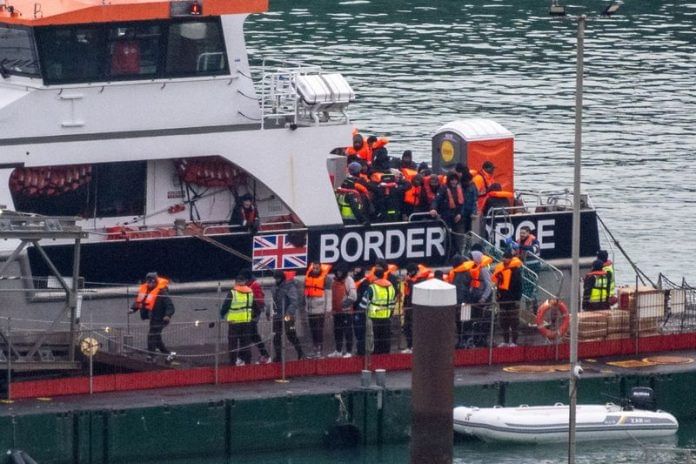LONDON (Reuters) -Britain set out plans on Monday to toughen its asylum system, with measures such as making refugee status temporary and reinterpreting human rights laws to make it easier to deport migrants who arrive illegally.
The moves are a bid to stem the rise of the populist Reform UK party, but the measures have been criticised by many charities, Labour lawmakers and supporters.
Here are details of the proposed measures:
TEMPORARY REFUGEE STATUS
Britain said it would make refugee status temporary, and subject to review every two-and-a-half years. Under the proposals, the status could be revoked if the refugee’s home country is deemed to be safe.
The wait for permanent settlement for refugees would be quadrupled to 20 years under the plans. Those looking to settle sooner would be required to work or study.
The government said the changes would replace the current system, which it has described as a “golden ticket” deal where refugees typically receive indefinite leave to remain after five years.
EUROPEAN COURT OF HUMAN RIGHTS
Britain will seek to deport more foreign criminals and migrants who arrive in the country illegally by legislating to change how domestic courts interpret the European Convention on Human Rights.
The ECHR was enshrined in British law in the 1998 Human Rights Act, passed by the last Labour government. But ministers have said its interpretation needs to change to make sure it is fit for the modern age and the challenge of issues like migration.
The government says Article 8 of the ECHR, the right to a family life, was being misused by migrants to delay their removal from Britain, and new laws would make clear a family connection means immediate family, such as a parent or child.
It said this change would stop people from “using dubious connections to stay in the UK”.
It added that Britain would also work with like-minded countries to review the application of Article 3, which prohibits torture, noting the “definition of ‘inhuman and degrading treatment’ has expanded beyond what is reasonable.”
The government has said it wants to remain in the European Convention on Human Rights, amid calls from Reform and the Conservative Party for Britain to leave it altogether.
VISA BANS
The government has also threatened visa bans on Angola, Namibia and the Democratic Republic of Congo unless those countries accepted the return of illegal migrants and criminals.
It said the countries face penalties for their “unacceptably low co-operation and obstructive returns processes.”
It added that “thousands of illegal migrants and criminals from these nations are currently in the UK, with the Home Office continually frustrated in its efforts to remove them.”
The penalties could result in “VIPs and tourists alike” being blocked from entering Britain unless the countries took action.
SAFE AND LEGAL ROUTES
New safe and legal routes for refugees to come to Britain will be established “once the government has restored control of Britain’s borders,” the interior ministry has said.
It identified three future routes to be established: a route for refugee and displaced students to study in Britain, a route for skilled workers, and a named sponsorship route, to be run by voluntary organisations.
It said the cap would be determined by interior minister Shabana Mahmood in due course.
(Reporting by Alistair Smout; Editing by Conor Humphries)
Disclaimer: This report is auto generated from the Reuters news service. ThePrint holds no responsibility for its content.






